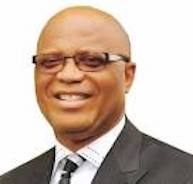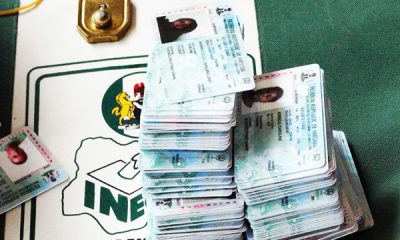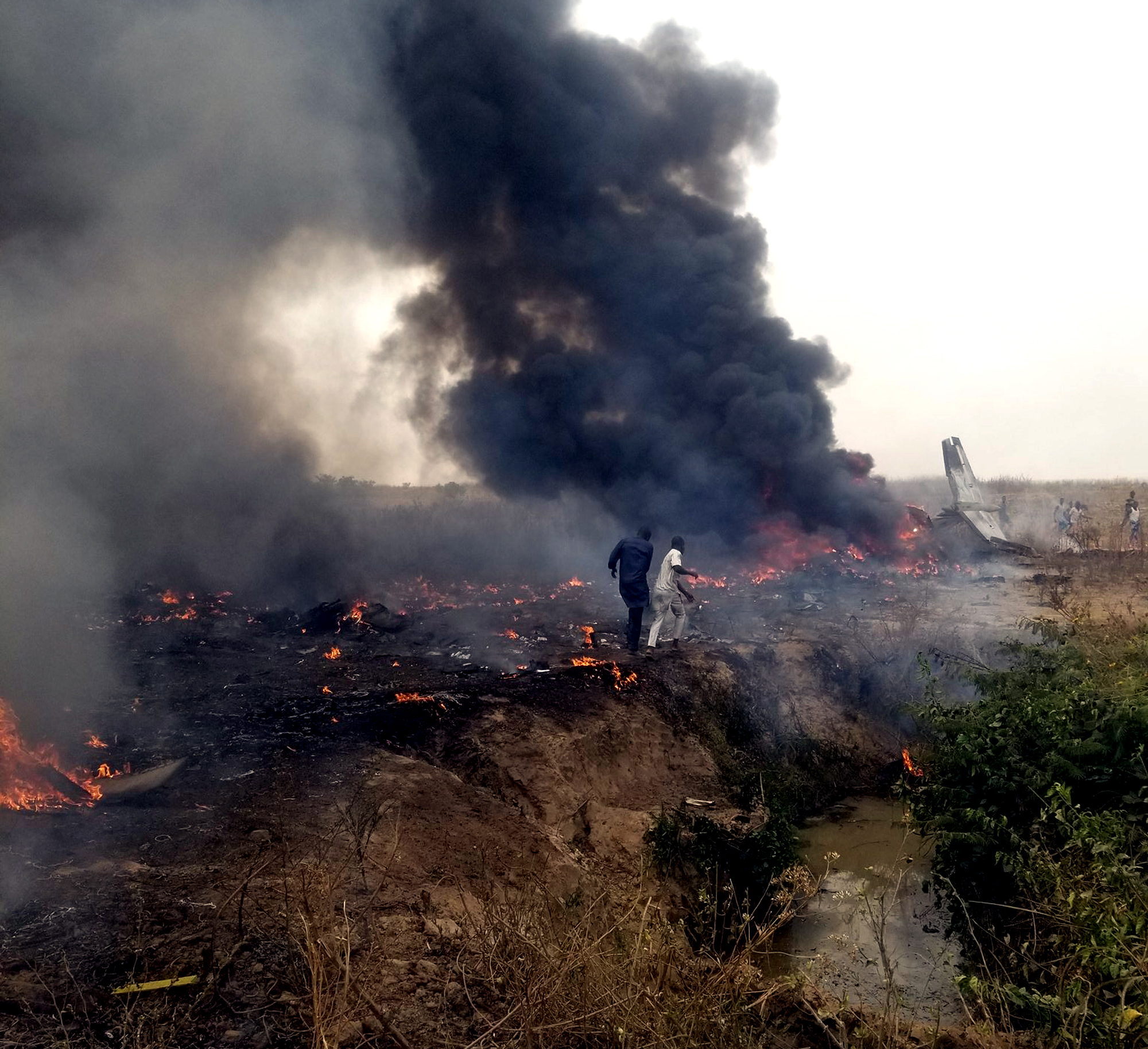COVER
SEC Announces New Rules on Warehousing, Collateral Management

By Tony Obiechina, Abuja
In a bid to ensure the nation has a vibrant commodities trading ecosystem which would in turn translate into foreign exchange earnings for the country, the Securities and Exchange Commission has announced new rules covering warehousing and collateral management among others.
According to a statement by SEC Head of Public Communication, Mrs Efe Ebelo in Abuja on Sunday, every warehouse that stores commodities to be traded on a registered Exchange shall apply to be registered by the Commission, while the Commission shall maintain a Register of all registered warehouses which shall be published on its website.
A warehouse applying for registration going by the rule, shall submit proof of ownership or registered-lease deed or rent agreement, along with disclaimer from the owner of the Warehouse/property providing waiver of ownership regarding Commodities stored in such Warehouse, in case of leased or rented Warehouse; present evidence of construction in compliance with the National Building Code, Present evidence of compliance with relevant Federal and State regulation relating to the operation of warehouses, and have facility(ies) appropriate for storage of commodities.
Other requirements are that the warehouse should have appropriate security arrangements in place, have adequate trained staff with expertise and knowledge of scientific storage of commodities, have requisite equipment for weighing and quality measures of commodities, as well as have comprehensive insurance cover for the building, equipment, stock and other items as may be necessary.
The Rule also states that “The warehouse should be located in a place with access to infrastructure to support its operations and have sufficient space for parking and movement of large vehicles, have an efficient system for loading/unloading of Commodity including proper mechanism for segregation of different kinds/quality of Commodity.
“They are to submit a Standard Operating Procedure (SOP) which shall cover the following among others: Procedures for acceptance of commodities to be deposited and delivery of commodities; procedures for weighing, sampling of goods to be deposited in compliance with industry standards, procedure for verification of commodities and communication to depositors, and procedure for maintaining the quality of the goods stored in line with relevant specifications.
“Others are procedure for Know your depositor, security policy for ensuring the safety of the goods, procedure for the use of modern techniques for storage of goods, procedure for determining and addressing losses due to theft, fire, burglary, fraud, negligence and force majeure events, procedure for internal verification of stock, procedure for maintenance of warehouse and preservations of Stock, Organizational structure and Job description for every staff”.
The rules states that for a Collateral Management Company to be registered by the Commission, an application shall be filed to the SEC accompanied by the relevant documents.
Some of the documents are two sets of completed appropriate S.E.C Forms to be filed by the sponsored individuals; a copy of the Certificate of Incorporation certified by the Corporate Affairs Commission where a copy not certified is filed, the applicant shall present the original for sighting by an authorized officer of the Commission; a copy of the Memorandum and Articles of Association certified by the Corporate Affairs Commission, which shall among others, include power to act as a Collateral Manager, a copy of the appropriate CAC Form containing particulars of the directors certified by the Corporate Affairs Commission; as well as a Copy of latest audited accounts or audited statement of affairs for companies in operation for less than one (1) year.
The rule further requires Fidelity Bond representing 20% of paid-up capital; sworn undertaking to keep proper records and render returns; evidence of minimum paid-up capital of N50 million. As well as application for registration of a minimum of two sponsored individuals one of whom shall be the chief executive officer.
“The two principal officers of the Collateral Management Company who shall be registered as sponsored officers must have a minimum of a university degree or its equivalent with not less than ten (10) years relevant post-qualification experience; a list of key officers and technical experts engaged and details of their qualifications, which should capture evidence of financial, technical capabilities to carry out the functions of a Collateral Manager, a list of relevant technology systems in place as required by collateral management services; information relating to the relevant Commodities Management Facilities including: Assaying facilities, Warehousing, Aggregation, Computerization and Telephone systems and a well finalized Business Plan;
“Two copies of existing or proposed by-laws or rules, Code of Conduct, Warehousing Guidelines etc., instruction and inspection manuals of warehouse activities; detailed information about the promoters and principal officers of the Collateral Management Company; two copies of Warehouse Accreditation requirements of the Collateral Management Company; detailed information about the Technology system to be adopted; and an Undertaking by the CMC to always forward copies of amendments of its Guidelines for approval by the Commission”.
On Management of the CMC, THE SEC rule stipulates that Board of directors and the chief executive should be appointed with prior approval of the Commission; key officers are to fulfil the fit and proper criteria as provided in these regulations; the CMC is expected to maintain the eligibility criteria provided by the Commission and notify the Commission immediately if it ceases to fulfil any of the conditions provided in these rules;
“Maintain high standard of integrity and fairness in discharging its functions and its dealing with other persons with whom it has agreed in writing to render services as CMC; Fulfil its obligations in a fair, efficient, transparent and ethical manner; and act with due skill, care and diligence in performing all its functions and discharging all its obligations and responsibilities;
“Upon Registration, the CMC is expected to display such license, in a conspicuous place, in the principal place of its business; establish the procedure for pledging, in favor of a financial institution, the Depositor’s commodities held with the Warehouse against which Electronic Warehouse Receipt has been issued; and certify a Warehouse”.
COVER
Aliko Dangote Steps Down as Chair of Dangote Sugar

Africa’s richest man, Aliko Dangote has stepped down as Chairman of the Board of Dangote Sugar Refinery Plc, marking the end of a two-decade leadership that transformed the company into a dominant force in Nigeria’s sugar industry.According to a corporate disclosure on Wednesday by the company’s Secretary, Temitope Hassan, Dangote’s retirement from the sugar company’s board takes effect from June 16, 2025Africa’s richest man, Aliko Dangote has stepped down as Chairman of the Board of Dangote Sugar Refinery Plc, marking the end of a two-decade leadership that transformed the company into a dominant force in Nigeria’s sugar industry.
Dangote has chaired the board since 2005, overseeing its significant growth and transformation, including major expansion projects and implementing best practices in corporate governance.“In line with the principles of good corporate governance and succession planning, Dangote Sugar Refinery Plc hereby announces the retirement of our esteemed Chairman of the Board of Directors, Alhaji Aliko Dangote, effective June 16, 2025,” the statement said.Under his leadership, the company launched key Backward Integration Projects (BIP) in Adamawa, Taraba, and Nasarawa States to boost local sugar production and reduce Nigeria’s reliance on imports.Following a “rigorous selection and transition process,” the Board has appointed Mr. Arnold Ekpe, an Independent Non-Executive Director and former Group CEO of Ecobank, as the new chairman.We are pleased to announce the appointment of Mr. Arnold Ekpe as the new Chairman of Dangote Sugar Refinery Plc, effective June 16, 2025,” the statement added.Ekpe brings decades of experience in banking and corporate governance, with a strong track record in leading multinational institutions across Africa.The Board thanked Dangote for his exemplary leadership and unwavering commitment to the company’s vision.“We welcome Mr. Ekpe to his new role and look forward to the next chapter in our company’s journey under his leadership. We also express our deep appreciation to Alhaji Aliko Dangote for his years of outstanding service,” the statement stated. (NAN)COVER
Police Arrests 42 Armed Bandits, Remands 10 Herders over Benue Killings

From Attah Ede, Makurdi
The Benue State Police Command said it has arrested 42 local armed bandits and herders across some communities in the state.The Commissioner of Police in the State, Ifeanyi Emenari, who disclosed this during his maiden media briefing held at the police officer mess Makurdi explained that those arrested were suspected to have been involved in the incessant killings going on in the state.
He pointed out that the armed Fulani herdsmen and bandits will face full trial. According to Police Commissioner Emenari, most of the suspects were arrested upon his assumption of duty in the last one month.He maintained that the command had taken the fight to those responsible for the attacks and killings in Benue communities, stressing that tactical teams have already been drafted to flashpoints across communities in the state.”I was posted to Benue State on the 24/04/2025 and assumed duty on the 26 April 2025. Upon assumption of duty, I step up strategic plans to tackle insecurity in the state.”I visited crisis areas such as Ankpali in Apa, Naka in Gwer West, Ayilamo in Logo, Amafu in Katsina-Ala, Ukum, Agatu, Udei, Yogbo in Guma Local Government Areas, and many others. I had discovered that farmlands have no farmers. Therefore, we have deployed our tactical teams to the areas and are now combing the communities in search of the killers.”We have a mandate to ensure that these communities are safe for the people to go back to their homes and engage in farming activities.”And in the last one month we have arrested 42 armed herdsmen and local bandits from these communities. Most of them have been charged to court.”We also have about 10 herdsmen who have been remanded by the courts in the course of their trial.”Apart from those already charged to court, there are others who are still being investigated and they would be charged to court at the end of investigations.””The command also recovered two AK47 rifles and 21 locally made firearms from the suspects. We had taken the fight to cult gangs in the state “that is why we have not witnessed or recorded cult related attacks in the state in the last one month since I assumed office.The kidnap incidents that happen regularly along Makurdi – Lafia federal highway have reduced drastically as we have arrested those perpetrating the acts and are currently in jail.”We have designed a plan to respond to any distress call within 30mns depending on the locations within the state”, Emenari added.The CP assured that the command would ensure that peace and security is restored to every nook and cranny of the state.He appealed to Benue people particularly in the rural communities and urban centres to cooperate with the police in its task of ensuring the security of lives and property in the state.He commended Governor Hyacinth Alia for his support to the Command, maintaining that his desire to ensure peace and security in the state would be achieved.”The entire governor wanted to make sure farmers go back to their farms and people are provided with adequate security to enable them to go on with their lawful business. We are ready to achieve that with the governor support”, he saidSimilarly, the Benue State Governor, Fr. Hyacinth Alia has reiterated that some politicians and “Religious bandits” are responsible for the needless crisis and aiding the killings of innocent people in the State.The Governor stated this while addressing the Pro-Tinibu group who staged a rally at the Government House Roundabout Makurdi, the state capital as part of the activities marking this year’s June 12 Democracy Day celebration.According to the Governor, “The Religious Bandits are the ones fuelling the insecurity situation being experiencing in the state.”They are doing this through their consistent rhetoric of unverified comments and distortion of facts.”There are some religious leaders I call ‘religious bandits’ who are fueling the bad situation we are experiencing here. And how do they support that, by their rhetoric. If you do not have the facts about Benue and Nigeria, shut up. Don’t just say something because you have the holy altar and oil to speak. Speak what you know and what can be verified.”There are some leaders who are fanning the embers of discord that peace should not return to the State.”We are still faced with insecurity as our people are killed unprovoked. We will take out this total menace and carnage of killings. We will not rest on our oars to ensure that total peace returns to Benue especially in the 6 LGAs that are in the frontline of insecurity.”Am confident that with the support of the President, we are going to get rid of insecurity completely in the State. Some traditional and religious leaders are also marching and fighting with us for peace to return to the State. Our people are suffering a lot and for some of us we have taken an oath to defend them and bring back peace”.”The day calls for sober reflection of how far the state and nation has journeyed in 26 years of uninterrupted democratic government, adding “We must pay tribute to the heroes who fought for democracy and sacrificed their lives for the unity of the country”Those heroes some are with us, others have gone to be with the Lord. They went through a lot including imprisonment, sacrificing for the unity of our country. It is not yet over for us. As we celebrate this day, people of conscience should note that what unites us is greater than what divides us. So, we must think positively for the State and the nation. We should have faith and hope for the nation.”Let us have a change of attitude and a different way of thinking. Let us sacrifice for the state and nation some more. Bring solutions to us and stop putting kerosene on fire. Let us know that Nigeria is our country and we can’t have another one.”Let us be our brother’s keeper. To the youths, a new Benue is possible and you are the new Benue. Let us do our best to ensure that Benue State is for prosperity and is secured. I am with the masses because they are with the people”, he stated.COVER
CBEX Remains Banned in Nigeria, SEC Warns Investors

By Tony Obiechina, Abuja
The Securities and Exchange Commission (SEC) is insisting that CBEX (Crypto Bridge Exchange), operating under the corporate identity of ST Technologies International Ltd, also known as Smart Treasure/Super Technology, remains banned in Nigeria as it has not been registered by the Commission.
SEC in a statement yesterday advised the public to refrain from patronising or transacting any investment related business with the CBEX. The notice read: “The attention of the Securities and Exchange Commission has been drawn to media reports indicating that CBEX (Crypto Bridge Exchange), operating under the corporate identity of ST Technologies International Ltd, also known as Smart Treasure/Super Technology, has resumed operations across Nigeria.“According to the reports, CBEX promoters are demanding $200 from their subscribers with balances above $1,000, and $100 from those with less than $1000 balances before withdrawals can be processed”.The Commission stated “unequivocally that neither CBEX nor ST Technologies International Ltd (or Smart Treasure/Super Technology) is registered with the Commission or authorized to offer investment related services to the Nigerian public.“As a matter of fact, enforcement action has already been initiated against CBEX and its promoters following its previous unauthorized investment activities and the Commission is collaborating with relevant Law Enforcement Agencies to properly investigate CBEX/ST Technologies International Ltd and will take appropriate actions in line with the provisions of the Investments and Securities Act 2025.“The Nigerian public is accordingly advised to refrain from patronising or transacting with CBEX /ST Technologies International Ltd (Smart Treasure or Super Technology) as they risk losing their funds”.The SEC advised investors to verify the registration status of Investment platforms via the Commission’s dedicated portal: www.sec.gov.ng/cmos before transacting, adding that it remains committed to protecting investors and maintaining market integrity.























